《新英格兰》——低碳水化合物饮食、地中海饮食和低脂肪饮食减肥的对比研究
低碳水高蛋白高脂肪
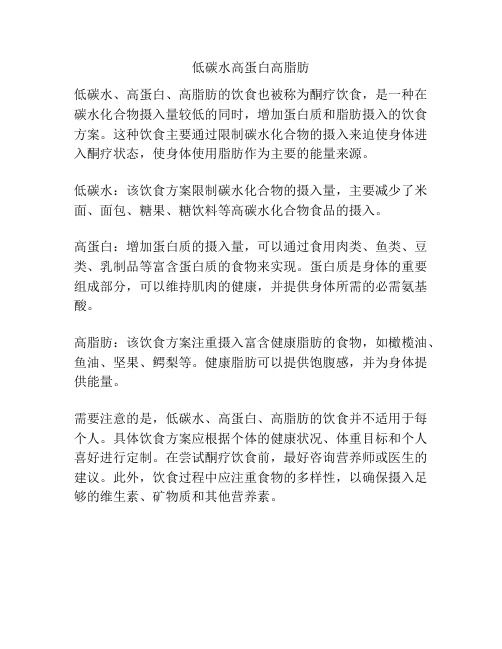
低碳水高蛋白高脂肪
低碳水、高蛋白、高脂肪的饮食也被称为酮疗饮食,是一种在碳水化合物摄入量较低的同时,增加蛋白质和脂肪摄入的饮食方案。
这种饮食主要通过限制碳水化合物的摄入来迫使身体进入酮疗状态,使身体使用脂肪作为主要的能量来源。
低碳水:该饮食方案限制碳水化合物的摄入量,主要减少了米面、面包、糖果、糖饮料等高碳水化合物食品的摄入。
高蛋白:增加蛋白质的摄入量,可以通过食用肉类、鱼类、豆类、乳制品等富含蛋白质的食物来实现。
蛋白质是身体的重要组成部分,可以维持肌肉的健康,并提供身体所需的必需氨基酸。
高脂肪:该饮食方案注重摄入富含健康脂肪的食物,如橄榄油、鱼油、坚果、鳄梨等。
健康脂肪可以提供饱腹感,并为身体提供能量。
需要注意的是,低碳水、高蛋白、高脂肪的饮食并不适用于每个人。
具体饮食方案应根据个体的健康状况、体重目标和个人喜好进行定制。
在尝试酮疗饮食前,最好咨询营养师或医生的建议。
此外,饮食过程中应注重食物的多样性,以确保摄入足够的维生素、矿物质和其他营养素。
地中海减肥法
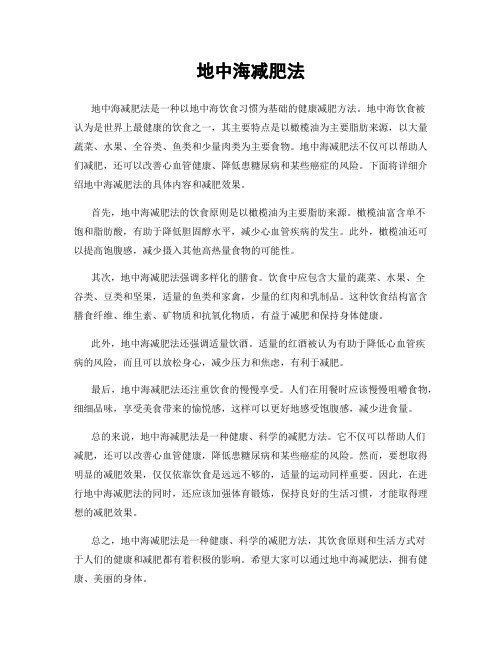
地中海减肥法地中海减肥法是一种以地中海饮食习惯为基础的健康减肥方法。
地中海饮食被认为是世界上最健康的饮食之一,其主要特点是以橄榄油为主要脂肪来源,以大量蔬菜、水果、全谷类、鱼类和少量肉类为主要食物。
地中海减肥法不仅可以帮助人们减肥,还可以改善心血管健康、降低患糖尿病和某些癌症的风险。
下面将详细介绍地中海减肥法的具体内容和减肥效果。
首先,地中海减肥法的饮食原则是以橄榄油为主要脂肪来源。
橄榄油富含单不饱和脂肪酸,有助于降低胆固醇水平,减少心血管疾病的发生。
此外,橄榄油还可以提高饱腹感,减少摄入其他高热量食物的可能性。
其次,地中海减肥法强调多样化的膳食。
饮食中应包含大量的蔬菜、水果、全谷类、豆类和坚果,适量的鱼类和家禽,少量的红肉和乳制品。
这种饮食结构富含膳食纤维、维生素、矿物质和抗氧化物质,有益于减肥和保持身体健康。
此外,地中海减肥法还强调适量饮酒。
适量的红酒被认为有助于降低心血管疾病的风险,而且可以放松身心,减少压力和焦虑,有利于减肥。
最后,地中海减肥法还注重饮食的慢慢享受。
人们在用餐时应该慢慢咀嚼食物,细细品味,享受美食带来的愉悦感,这样可以更好地感受饱腹感,减少进食量。
总的来说,地中海减肥法是一种健康、科学的减肥方法。
它不仅可以帮助人们减肥,还可以改善心血管健康,降低患糖尿病和某些癌症的风险。
然而,要想取得明显的减肥效果,仅仅依靠饮食是远远不够的,适量的运动同样重要。
因此,在进行地中海减肥法的同时,还应该加强体育锻炼,保持良好的生活习惯,才能取得理想的减肥效果。
总之,地中海减肥法是一种健康、科学的减肥方法,其饮食原则和生活方式对于人们的健康和减肥都有着积极的影响。
希望大家可以通过地中海减肥法,拥有健康、美丽的身体。
饮食模式与肥胖症的关系研究
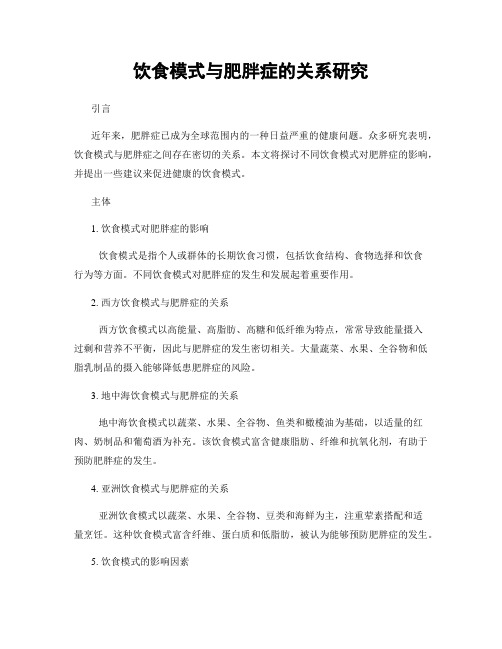
饮食模式与肥胖症的关系研究引言近年来,肥胖症已成为全球范围内的一种日益严重的健康问题。
众多研究表明,饮食模式与肥胖症之间存在密切的关系。
本文将探讨不同饮食模式对肥胖症的影响,并提出一些建议来促进健康的饮食模式。
主体1. 饮食模式对肥胖症的影响饮食模式是指个人或群体的长期饮食习惯,包括饮食结构、食物选择和饮食行为等方面。
不同饮食模式对肥胖症的发生和发展起着重要作用。
2. 西方饮食模式与肥胖症的关系西方饮食模式以高能量、高脂肪、高糖和低纤维为特点,常常导致能量摄入过剩和营养不平衡,因此与肥胖症的发生密切相关。
大量蔬菜、水果、全谷物和低脂乳制品的摄入能够降低患肥胖症的风险。
3. 地中海饮食模式与肥胖症的关系地中海饮食模式以蔬菜、水果、全谷物、鱼类和橄榄油为基础,以适量的红肉、奶制品和葡萄酒为补充。
该饮食模式富含健康脂肪、纤维和抗氧化剂,有助于预防肥胖症的发生。
4. 亚洲饮食模式与肥胖症的关系亚洲饮食模式以蔬菜、水果、全谷物、豆类和海鲜为主,注重荤素搭配和适量烹饪。
这种饮食模式富含纤维、蛋白质和低脂肪,被认为能够预防肥胖症的发生。
5. 饮食模式的影响因素饮食模式的形成受到多种因素的影响,包括文化、经济、社会和心理等方面。
人们的生活方式、文化习俗和心理状态都会影响他们的饮食选择和饮食行为。
6. 促进健康的饮食模式为了促进健康的饮食模式,我们可以从以下几个方面进行努力:a. 提倡均衡饮食:饮食中应包含多种类的食物,如蔬菜、水果、全谷物、蛋白质和健康脂肪,避免单一食物或食物组合的过度摄入。
b. 限制能量密度高的食物:如高脂肪和高糖食品,如糕点、巧克力和碳酸饮料等。
适量摄入有助于控制体重和预防肥胖症的发生。
c. 培养健康的饮食习惯:包括规律的饮食时间、慢咀嚼、适量进食、避免过度进食和餐桌礼仪等。
d. 进行适量的体育锻炼:饮食模式与体育锻炼相辅相成,合理运动可以帮助身体健康,并避免肥胖症的发生。
结论不同的饮食模式对肥胖症的发生和发展有着明显的影响。
地中海饮食:健康的饮食模式
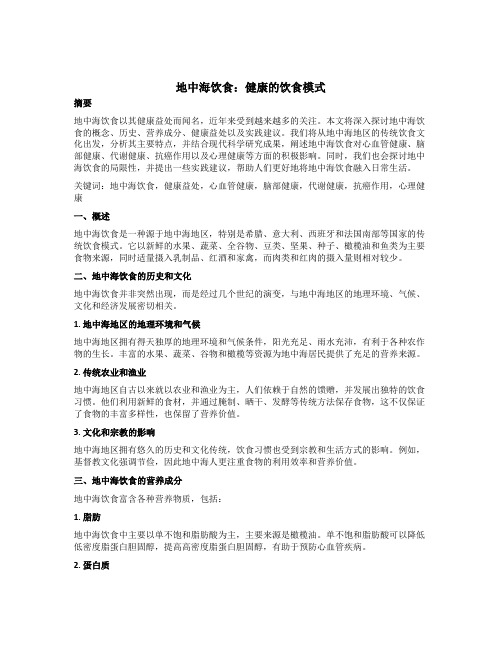
地中海饮食:健康的饮食模式摘要地中海饮食以其健康益处而闻名,近年来受到越来越多的关注。
本文将深入探讨地中海饮食的概念、历史、营养成分、健康益处以及实践建议。
我们将从地中海地区的传统饮食文化出发,分析其主要特点,并结合现代科学研究成果,阐述地中海饮食对心血管健康、脑部健康、代谢健康、抗癌作用以及心理健康等方面的积极影响。
同时,我们也会探讨地中海饮食的局限性,并提出一些实践建议,帮助人们更好地将地中海饮食融入日常生活。
关键词:地中海饮食,健康益处,心血管健康,脑部健康,代谢健康,抗癌作用,心理健康一、概述地中海饮食是一种源于地中海地区,特别是希腊、意大利、西班牙和法国南部等国家的传统饮食模式。
它以新鲜的水果、蔬菜、全谷物、豆类、坚果、种子、橄榄油和鱼类为主要食物来源,同时适量摄入乳制品、红酒和家禽,而肉类和红肉的摄入量则相对较少。
二、地中海饮食的历史和文化地中海饮食并非突然出现,而是经过几个世纪的演变,与地中海地区的地理环境、气候、文化和经济发展密切相关。
1. 地中海地区的地理环境和气候地中海地区拥有得天独厚的地理环境和气候条件,阳光充足、雨水充沛,有利于各种农作物的生长。
丰富的水果、蔬菜、谷物和橄榄等资源为地中海居民提供了充足的营养来源。
2. 传统农业和渔业地中海地区自古以来就以农业和渔业为主,人们依赖于自然的馈赠,并发展出独特的饮食习惯。
他们利用新鲜的食材,并通过腌制、晒干、发酵等传统方法保存食物,这不仅保证了食物的丰富多样性,也保留了营养价值。
3. 文化和宗教的影响地中海地区拥有悠久的历史和文化传统,饮食习惯也受到宗教和生活方式的影响。
例如,基督教文化强调节俭,因此地中海人更注重食物的利用效率和营养价值。
三、地中海饮食的营养成分地中海饮食富含各种营养物质,包括:1. 脂肪地中海饮食中主要以单不饱和脂肪酸为主,主要来源是橄榄油。
单不饱和脂肪酸可以降低低密度脂蛋白胆固醇,提高高密度脂蛋白胆固醇,有助于预防心血管疾病。
低碳水化合物饮食--生酮饮食与健康
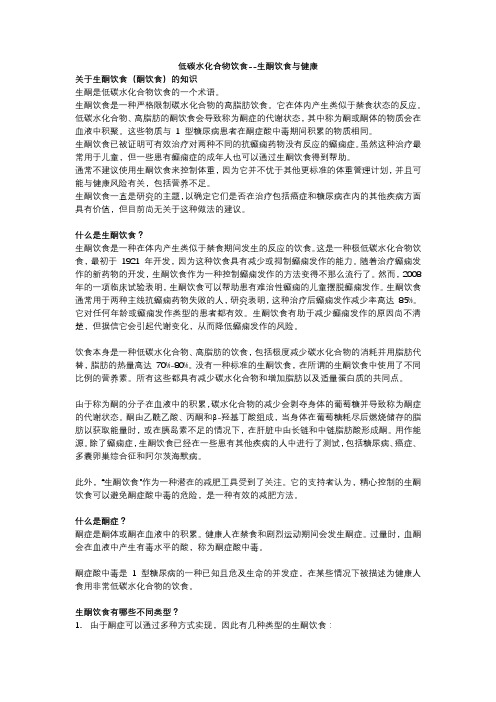
低碳水化合物饮食--生酮饮食与健康关于生酮饮食(酮饮食)的知识生酮是低碳水化合物饮食的一个术语。
生酮饮食是一种严格限制碳水化合物的高脂肪饮食。
它在体内产生类似于禁食状态的反应。
低碳水化合物、高脂肪的酮饮食会导致称为酮症的代谢状态,其中称为酮或酮体的物质会在血液中积聚。
这些物质与1 型糖尿病患者在酮症酸中毒期间积累的物质相同。
生酮饮食已被证明可有效治疗对两种不同的抗癫痫药物没有反应的癫痫症。
虽然这种治疗最常用于儿童,但一些患有癫痫症的成年人也可以通过生酮饮食得到帮助。
通常不建议使用生酮饮食来控制体重,因为它并不优于其他更标准的体重管理计划,并且可能与健康风险有关,包括营养不足。
生酮饮食一直是研究的主题,以确定它们是否在治疗包括癌症和糖尿病在内的其他疾病方面具有价值,但目前尚无关于这种做法的建议。
什么是生酮饮食?生酮饮食是一种在体内产生类似于禁食期间发生的反应的饮食。
这是一种极低碳水化合物饮食,最初于1921 年开发,因为这种饮食具有减少或抑制癫痫发作的能力。
随着治疗癫痫发作的新药物的开发,生酮饮食作为一种控制癫痫发作的方法变得不那么流行了。
然而,2008 年的一项临床试验表明,生酮饮食可以帮助患有难治性癫痫的儿童摆脱癫痫发作。
生酮饮食通常用于两种主线抗癫痫药物失败的人,研究表明,这种治疗后癫痫发作减少率高达85%。
它对任何年龄或癫痫发作类型的患者都有效。
生酮饮食有助于减少癫痫发作的原因尚不清楚,但据信它会引起代谢变化,从而降低癫痫发作的风险。
饮食本身是一种低碳水化合物、高脂肪的饮食,包括极度减少碳水化合物的消耗并用脂肪代替,脂肪的热量高达70%-80%。
没有一种标准的生酮饮食,在所谓的生酮饮食中使用了不同比例的营养素。
所有这些都具有减少碳水化合物和增加脂肪以及适量蛋白质的共同点。
由于称为酮的分子在血液中的积累,碳水化合物的减少会剥夺身体的葡萄糖并导致称为酮症的代谢状态。
酮由乙酰乙酸、丙酮和β-羟基丁酸组成,当身体在葡萄糖耗尽后燃烧储存的脂肪以获取能量时,或在胰岛素不足的情况下,在肝脏中由长链和中链脂肪酸形成酮。
地中海饮食对减肥的益处

地中海饮食对减肥的益处地中海饮食已经成为减肥领域中备受推崇的一种饮食方式,它以低脂肪、高纤维、富含抗氧化物和健康脂肪的食物为特点。
许多研究表明,地中海饮食不仅可以帮助人们减肥,还能够改善心血管健康、降低患癌风险和延长寿命。
本文将详细介绍地中海饮食对减肥的益处以及如何合理地采用这种饮食模式。
地中海饮食概述地中海饮食源于地中海沿岸国家的传统饮食习惯,主要以橄榄油、水果、蔬菜、全谷物、豆类、坚果和鱼类为主要食物。
与此同时,地中海饮食限制了红肉、加工食品和糖的摄入量。
这种饮食方式注重新鲜、多样化的食材,每日适量的运动也是其中的重要组成部分。
地中海饮食对减肥的益处1. 低脂肪富纤维地中海饮食注重使用橄榄油作为主要油脂,并大量摄入蔬菜和水果。
橄榄油富含单不饱和脂肪酸,有助于降低坏胆固醇水平,减少心血管疾病的发生。
蔬菜和水果提供丰富的纤维,增加饱腹感,减少进食量。
2. 高抗氧化剂地中海饮食注重摄入富含抗氧化物质的食物,如番茄、红葡萄酒、坚果等。
这些抗氧化物质可以中和自由基对身体细胞的损害,保护心血管系统健康,并有助于降低慢性疾病的发生。
3. 健康脂肪地中海饮食强调摄入健康脂肪,例如来自橄榄油和坚果等植物油脂。
这些健康脂肪可以提供必需脂肪酸和脂溶性维生素,并有助于调节胰岛素水平,促进代谢平衡。
4. 富含营养物质地中海饮食强调多样化的食材搭配,提供多种营养物质。
例如,使用新鲜草本植物作为调味料可以增加抗氧化剂和矿物质的摄入量。
同时,常吃豆类提供优质蛋白质和低糖碳水化合物。
5. 控制碳水化合物摄入虽然地中海饮食主要以碳水化合物为能量来源,但通过选择全谷物和新鲜水果来控制碳水化合物的摄入量。
这对于减少高升糖指数食品(如白面包、白米饭)的摄入非常重要。
如何采用地中海饮食在采用地中海饮食进行减肥时,需要注意以下几点:1. 增加蔬菜和水果摄入每天摄入多种颜色的新鲜蔬菜和水果,保证营养均衡并增加纤维摄入。
2. 多吃豆类及坚果增加豆类如豌豆、扁豆以及吃一些坚果如杏仁、核桃作为零点心。
地中海食谱减肥
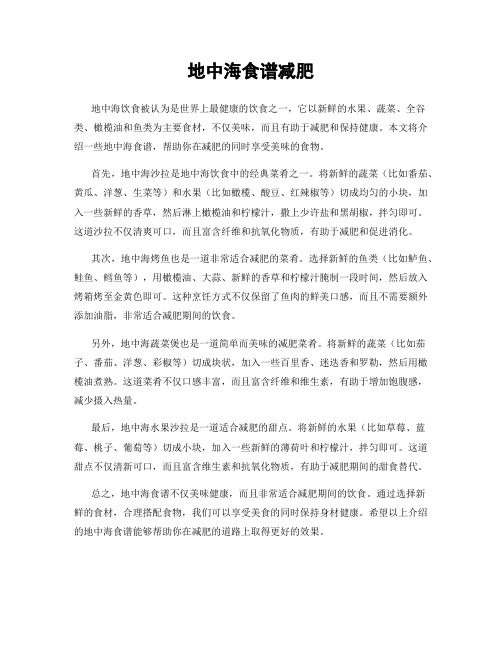
地中海食谱减肥地中海饮食被认为是世界上最健康的饮食之一,它以新鲜的水果、蔬菜、全谷类、橄榄油和鱼类为主要食材,不仅美味,而且有助于减肥和保持健康。
本文将介绍一些地中海食谱,帮助你在减肥的同时享受美味的食物。
首先,地中海沙拉是地中海饮食中的经典菜肴之一。
将新鲜的蔬菜(比如番茄、黄瓜、洋葱、生菜等)和水果(比如橄榄、酸豆、红辣椒等)切成均匀的小块,加入一些新鲜的香草,然后淋上橄榄油和柠檬汁,撒上少许盐和黑胡椒,拌匀即可。
这道沙拉不仅清爽可口,而且富含纤维和抗氧化物质,有助于减肥和促进消化。
其次,地中海烤鱼也是一道非常适合减肥的菜肴。
选择新鲜的鱼类(比如鲈鱼、鲑鱼、鳕鱼等),用橄榄油、大蒜、新鲜的香草和柠檬汁腌制一段时间,然后放入烤箱烤至金黄色即可。
这种烹饪方式不仅保留了鱼肉的鲜美口感,而且不需要额外添加油脂,非常适合减肥期间的饮食。
另外,地中海蔬菜煲也是一道简单而美味的减肥菜肴。
将新鲜的蔬菜(比如茄子、番茄、洋葱、彩椒等)切成块状,加入一些百里香、迷迭香和罗勒,然后用橄榄油煮熟。
这道菜肴不仅口感丰富,而且富含纤维和维生素,有助于增加饱腹感,减少摄入热量。
最后,地中海水果沙拉是一道适合减肥的甜点。
将新鲜的水果(比如草莓、蓝莓、桃子、葡萄等)切成小块,加入一些新鲜的薄荷叶和柠檬汁,拌匀即可。
这道甜点不仅清新可口,而且富含维生素和抗氧化物质,有助于减肥期间的甜食替代。
总之,地中海食谱不仅美味健康,而且非常适合减肥期间的饮食。
通过选择新鲜的食材,合理搭配食物,我们可以享受美食的同时保持身材健康。
希望以上介绍的地中海食谱能够帮助你在减肥的道路上取得更好的效果。
三种低碳饮食各有不同含义

总而言之,虽然目前对低碳饮食有不 同的解读方式,但笔者认为临床上还是以 控制碳水化合物的供能比为主,最好的方 式是结合患者的日常饮食习惯,并且监测 患者的反应后进行调整。■
(发稿编辑:吴王群)
39 2019.03 No.7
生酮饮食低碳高脂 在实际应用中,当低碳饮食的碳水化 合物摄入低于每日总热量的20%时,机体 会产生酮体,因此多数情况下,低碳饮食 也被称作生酮饮食,或者低碳生酮饮食。 严格意义上来说,生酮饮食属于低碳 饮食的一种,生酮饮食的碳水化合物比例 极低(供能比10%以下),脂肪比例极高 (供能比70%左右)。两者比较而言,生 酮饮食的可操作性更难。 生酮饮食最早应用于罹患癫痫特别 是难治性癫痫的儿童,但是有报道称癫痫 儿童服用生酮饮食后出现高钙尿症、高钙 血症,甚至肾结石,原因可能在于经典生 酮饮食对于碳水化合物的限制极为严苛, 每日仅能摄取10~15g,而脂肪占比高达 90%。由于这种经典生酮饮食需要特殊调 配,在自然饮食状态下不可能达到那么极 端的低碳高脂的比例,因此该副作用并未 见于成人低碳饮食的报道中。
糖尿病患者高纤维复合碳水化合物 对于糖尿病患者,相关的膳食指南
中年人最好选择地中海饮食,对减肥,大脑,心血管,糖尿病和癌症都好
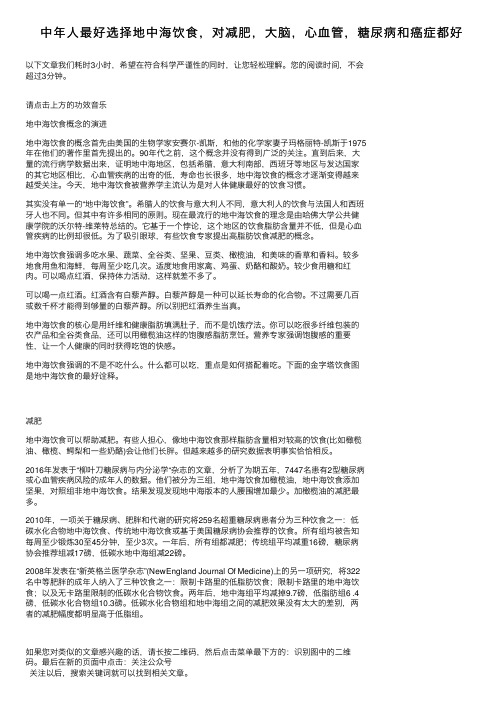
中年⼈最好选择地中海饮⾷,对减肥,⼤脑,⼼⾎管,糖尿病和癌症都好以下⽂章我们耗时3⼩时,希望在符合科学严谨性的同时,让您轻松理解。
您的阅读时间,不会超过3分钟。
请点击上⽅的功效⾳乐地中海饮⾷概念的演进地中海饮⾷的概念⾸先由美国的⽣物学家安赛尔-凯斯,和他的化学家妻⼦玛格丽特-凯斯于1975年在他们的著作⾥⾸先提出的。
90年代之前,这个概念并没有得到⼴泛的关注。
直到后来,⼤量的流⾏病学数据出来,证明地中海地区,包括希腊,意⼤利南部,西班⽛等地区与发达国家的其它地区相⽐,⼼⾎管疾病的出奇的低,寿命也长很多,地中海饮⾷的概念才逐渐变得越来越受关注。
今天,地中海饮⾷被营养学主流认为是对⼈体健康最好的饮⾷习惯。
其实没有单⼀的“地中海饮⾷”。
希腊⼈的饮⾷与意⼤利⼈不同,意⼤利⼈的饮⾷与法国⼈和西班⽛⼈也不同。
但其中有许多相同的原则。
现在最流⾏的地中海饮⾷的理念是由哈佛⼤学公共健康学院的沃尔特-维莱特总结的。
它基于⼀个悖论,这个地区的饮⾷脂肪含量并不低,但是⼼⾎管疾病的⽐例却很低。
为了吸引眼球,有些饮⾷专家提出⾼脂肪饮⾷减肥的概念。
地中海饮⾷强调多吃⽔果、蔬菜、全⾕类、坚果、⾖类、橄榄油,和美味的⾹草和⾹料。
较多地⾷⽤鱼和海鲜,每周⾄少吃⼏次。
适度地⾷⽤家禽、鸡蛋、奶酪和酸奶。
较少⾷⽤糖和红⾁。
可以喝点红酒,保持体⼒活动,这样就差不多了。
可以喝⼀点红酒。
红酒含有⽩藜芦醇。
⽩藜芦醇是⼀种可以延长寿命的化合物。
不过需要⼏百或数千杯才能得到够量的⽩藜芦醇。
所以别把红酒养⽣当真。
地中海饮⾷的核⼼是⽤纤维和健康脂肪填满肚⼦,⽽不是饥饿疗法。
你可以吃很多纤维包装的农产品和全⾕类⾷品,还可以⽤橄榄油这样的饱腹感脂肪烹饪。
营养专家强调饱腹感的重要性,让⼀个⼈健康的同时获得吃饱的快感。
地中海饮⾷强调的不是不吃什么。
什么都可以吃,重点是如何搭配着吃。
下⾯的⾦字塔饮⾷图是地中海饮⾷的最好诠释。
减肥地中海饮⾷可以帮助减肥。
有些⼈担⼼,像地中海饮⾷那样脂肪含量相对较⾼的饮⾷(⽐如橄榄油、橄榄、鳄梨和⼀些奶酪)会让他们长胖。
试验饮食案例
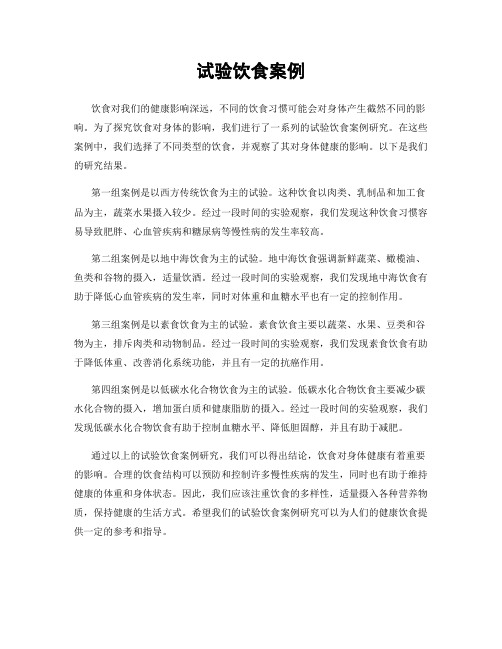
试验饮食案例饮食对我们的健康影响深远,不同的饮食习惯可能会对身体产生截然不同的影响。
为了探究饮食对身体的影响,我们进行了一系列的试验饮食案例研究。
在这些案例中,我们选择了不同类型的饮食,并观察了其对身体健康的影响。
以下是我们的研究结果。
第一组案例是以西方传统饮食为主的试验。
这种饮食以肉类、乳制品和加工食品为主,蔬菜水果摄入较少。
经过一段时间的实验观察,我们发现这种饮食习惯容易导致肥胖、心血管疾病和糖尿病等慢性病的发生率较高。
第二组案例是以地中海饮食为主的试验。
地中海饮食强调新鲜蔬菜、橄榄油、鱼类和谷物的摄入,适量饮酒。
经过一段时间的实验观察,我们发现地中海饮食有助于降低心血管疾病的发生率,同时对体重和血糖水平也有一定的控制作用。
第三组案例是以素食饮食为主的试验。
素食饮食主要以蔬菜、水果、豆类和谷物为主,排斥肉类和动物制品。
经过一段时间的实验观察,我们发现素食饮食有助于降低体重、改善消化系统功能,并且有一定的抗癌作用。
第四组案例是以低碳水化合物饮食为主的试验。
低碳水化合物饮食主要减少碳水化合物的摄入,增加蛋白质和健康脂肪的摄入。
经过一段时间的实验观察,我们发现低碳水化合物饮食有助于控制血糖水平、降低胆固醇,并且有助于减肥。
通过以上的试验饮食案例研究,我们可以得出结论,饮食对身体健康有着重要的影响。
合理的饮食结构可以预防和控制许多慢性疾病的发生,同时也有助于维持健康的体重和身体状态。
因此,我们应该注重饮食的多样性,适量摄入各种营养物质,保持健康的生活方式。
希望我们的试验饮食案例研究可以为人们的健康饮食提供一定的参考和指导。
低碳水化合物饮食的益处

低碳水化合物饮食的益处低碳水化合物饮食,作为一种健康饮食方式,近年来备受关注。
随着人们健康意识的提升,越来越多的人开始关注自己的饮食习惯,低碳水化合物饮食因其独特的优势逐渐成为人们选择的健康生活方式。
本文将从减肥效果、稳定血糖、改善心血管健康、增强代谢能力等方面,探讨低碳水化合物饮食的益处。
首先,低碳水化合物饮食对减肥效果显著。
碳水化合物是人体获取能量的主要来源,而过多摄入碳水化合物会导致热量摄入过多,进而转化为脂肪储存在体内,导致体重增加。
相比之下,低碳水化合物饮食能够有效减少热量摄入,促进脂肪燃烧,有助于减肥瘦身。
许多研究表明,采用低碳水化合物饮食的人群在减肥过程中取得了显著的成效,不仅能够减轻体重,还能改善体脂肪含量,塑造更加健康的体态。
其次,低碳水化合物饮食有助于稳定血糖水平。
高碳水化合物饮食容易导致血糖波动,使血糖水平忽高忽低,不仅容易引发饥饿感和疲劳感,还会增加患糖尿病等疾病的风险。
而低碳水化合物饮食能够有效控制血糖的上升速度,减少胰岛素的分泌,有助于维持血糖在稳定水平,降低罹患糖尿病的风险,对于已经患有糖尿病的人群也有助于控制血糖水平,减少并发症的发生。
此外,低碳水化合物饮食还有助于改善心血管健康。
过多摄入碳水化合物容易导致血脂异常,增加心血管疾病的发生风险。
而低碳水化合物饮食能够有效降低甘油三酯和总胆固醇水平,提高“好”胆固醇水平,有助于改善心血管健康,降低患心脏病的风险。
长期坚持低碳水化合物饮食,可以有效预防高血压、动脉硬化等心血管疾病的发生。
最后,低碳水化合物饮食还能增强代谢能力。
摄入过多碳水化合物容易导致能量过剩,转化为脂肪储存在体内,影响代谢功能。
而低碳水化合物饮食能够促进脂肪燃烧,增加身体对脂肪的利用,提高基础代谢率,有助于减少脂肪堆积,增强代谢能力。
通过低碳水化合物饮食,不仅可以减少脂肪囤积,还能提高身体的能量消耗效率,有助于保持身体的健康状态。
综上所述,低碳水化合物饮食具有诸多益处,包括减肥效果显著、稳定血糖、改善心血管健康、增强代谢能力等。
我相信低碳水饮食最吸引人的一点,是它卓越的减肥效果。那么牛排决对是最好的选择
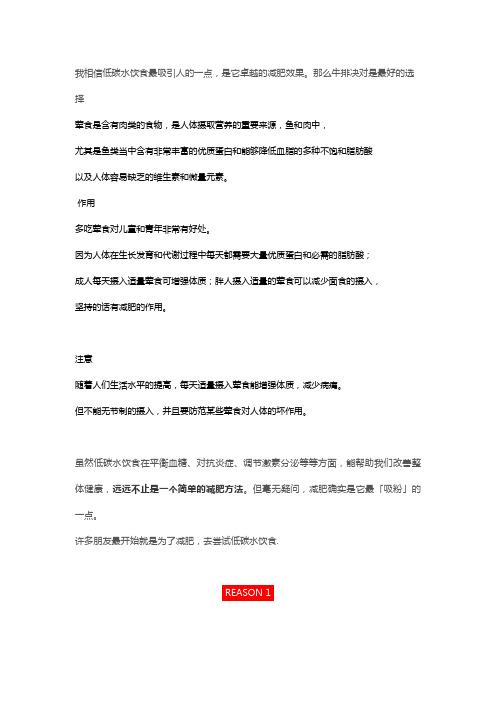
我相信低碳水饮食最吸引人的一点,是它卓越的减肥效果。
那么牛排决对是最好的选择荤食是含有肉类的食物,是人体摄取营养的重要来源,鱼和肉中,尤其是鱼类当中含有非常丰富的优质蛋白和能够降低血脂的多种不饱和脂肪酸以及人体容易缺乏的维生素和微量元素。
作用多吃荤食对儿童和青年非常有好处。
因为人体在生长发育和代谢过程中每天都需要大量优质蛋白和必需的脂肪酸;成人每天摄入适量荤食可增强体质;胖人摄入适量的荤食可以减少面食的摄入,坚持的话有减肥的作用。
注意随着人们生活水平的提高,每天适量摄入荤食能增强体质,减少病痛。
但不能无节制的摄入,并且要防范某些荤食对人体的坏作用。
虽然低碳水饮食在平衡血糖、对抗炎症、调节激素分泌等等方面,能帮助我们改善整体健康,远远不止是一个简单的减肥方法。
但毫无疑问,减肥确实是它最「吸粉」的一点。
许多朋友最开始就是为了减肥,去尝试低碳水饮食.购物清单1.蛋白质只能来自鸡蛋、鱼、鸡肉和羊肉海鲜,深海鱼,带壳,虾2.任何含有淀粉的蔬菜都不吃3.可以使用少量香草、醋和柠檬4.每天吃适量的坚果5.可以吃一些豆类,不过只能将其作为煮汤的佐料6.大量使用橄榄油7.想吃零食的话,只能选择橄榄、沙丁鱼,浆果、黄瓜其实,减肥不是一个体重单调向下的线性过程。
开始使用低碳水饮食减脂之后,如果你每天称体重,你可能会发现有一些日子体重数字持续变小,而有一些日子体重数字不变甚至会上升一丢丢。
不要焦虑,只要整体趋势是下降的,就意味着低碳水饮食在见效。
你需要对自己的身体多一些耐心,认真坚持一段时间。
许多人在开始低碳水饮食的第一周内减的最多最快,因为这个阶段减去的大部分是身体多余的水分,而不是真正的体脂。
过了这个阶段,体重下降的速度就会慢下来。
而且,减脂并不等于减重。
如果你摄入了比之前更多的蛋白质,或者你在低碳水饮食的同时开始做力量训练,那么你会增加一些肌肉。
肌肉的密度数倍于脂肪,这时即使你还在减脂,体重数字却没有下降。
所以,如果你体重数字没变,但是别人都说你看上去瘦了,或者感觉到衣服变宽松了,或者干脆,你量一量自己的腰围臀围大腿围,发现变小了——不要怀疑,你在燃烧脂肪。
减肥餐排行榜
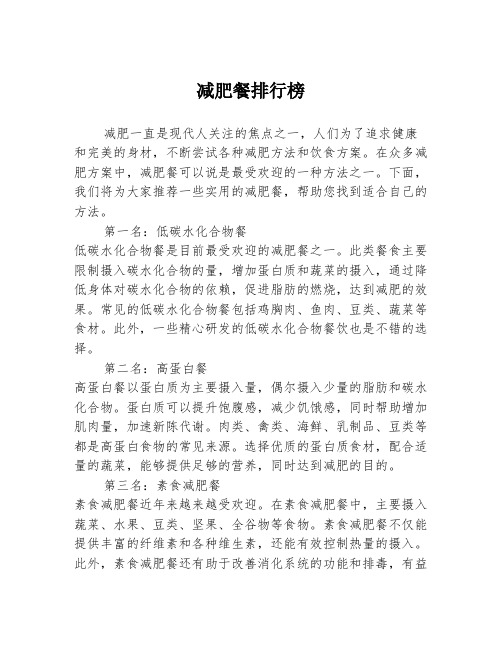
减肥餐排行榜减肥一直是现代人关注的焦点之一,人们为了追求健康和完美的身材,不断尝试各种减肥方法和饮食方案。
在众多减肥方案中,减肥餐可以说是最受欢迎的一种方法之一。
下面,我们将为大家推荐一些实用的减肥餐,帮助您找到适合自己的方法。
第一名:低碳水化合物餐低碳水化合物餐是目前最受欢迎的减肥餐之一。
此类餐食主要限制摄入碳水化合物的量,增加蛋白质和蔬菜的摄入,通过降低身体对碳水化合物的依赖,促进脂肪的燃烧,达到减肥的效果。
常见的低碳水化合物餐包括鸡胸肉、鱼肉、豆类、蔬菜等食材。
此外,一些精心研发的低碳水化合物餐饮也是不错的选择。
第二名:高蛋白餐高蛋白餐以蛋白质为主要摄入量,偶尔摄入少量的脂肪和碳水化合物。
蛋白质可以提升饱腹感,减少饥饿感,同时帮助增加肌肉量,加速新陈代谢。
肉类、禽类、海鲜、乳制品、豆类等都是高蛋白食物的常见来源。
选择优质的蛋白质食材,配合适量的蔬菜,能够提供足够的营养,同时达到减肥的目的。
第三名:素食减肥餐素食减肥餐近年来越来越受欢迎。
在素食减肥餐中,主要摄入蔬菜、水果、豆类、坚果、全谷物等食物。
素食减肥餐不仅能提供丰富的纤维素和各种维生素,还能有效控制热量的摄入。
此外,素食减肥餐还有助于改善消化系统的功能和排毒,有益身体健康。
第四名:定制减肥餐定制减肥餐是根据个人的身体状况、减肥目标和口味偏好进行制定的,可以说是最适合个人需求的减肥餐之一。
通过专业机构或个人营养师的指导,量身定制的减肥餐既能保证营养的供给,又能帮助达到减肥的效果。
综上所述,减肥餐是一种非常实用的减肥方法,通过合理的搭配食材和饮食方式,可以达到减肥的目的。
然而,在选择减肥餐时,我们必须考虑到个人的身体状况和口味偏好,选择适合自己的减肥餐,才能达到最好的减肥效果。
同时,减肥餐只是减肥的一部分,结合适量的运动和良好的生活习惯,才能达到健康减肥的效果。
希望大家能够找到适合自己的减肥餐,健康减肥,塑造完美身材。
低碳饮食
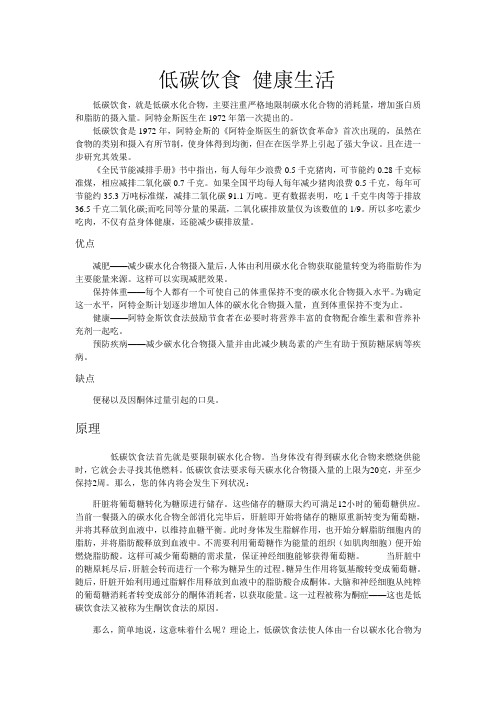
低碳饮食健康生活低碳饮食,就是低碳水化合物,主要注重严格地限制碳水化合物的消耗量,增加蛋白质和脂肪的摄入量。
阿特金斯医生在1972年第一次提出的。
低碳饮食是1972年,阿特金斯的《阿特金斯医生的新饮食革命》首次出现的,虽然在食物的类别和摄入有所节制,使身体得到均衡,但在在医学界上引起了强大争议。
且在进一步研究其效果。
《全民节能减排手册》书中指出,每人每年少浪费0.5千克猪肉,可节能约0.28千克标准煤,相应减排二氧化碳0.7千克。
如果全国平均每人每年减少猪肉浪费0.5千克,每年可节能约35.3万吨标准煤,减排二氧化碳91.1万吨。
更有数据表明,吃1千克牛肉等于排放36.5千克二氧化碳;而吃同等分量的果蔬,二氧化碳排放量仅为该数值的1/9。
所以多吃素少吃肉,不仅有益身体健康,还能减少碳排放量。
优点减肥——减少碳水化合物摄入量后,人体由利用碳水化合物获取能量转变为将脂肪作为主要能量来源。
这样可以实现减肥效果。
保持体重——每个人都有一个可使自己的体重保持不变的碳水化合物摄入水平。
为确定这一水平,阿特金斯计划逐步增加人体的碳水化合物摄入量,直到体重保持不变为止。
健康——阿特金斯饮食法鼓励节食者在必要时将营养丰富的食物配合维生素和营养补充剂一起吃。
预防疾病——减少碳水化合物摄入量并由此减少胰岛素的产生有助于预防糖尿病等疾病。
缺点便秘以及因酮体过量引起的口臭。
原理低碳饮食法首先就是要限制碳水化合物。
当身体没有得到碳水化合物来燃烧供能时,它就会去寻找其他燃料。
低碳饮食法要求每天碳水化合物摄入量的上限为20克,并至少保持2周。
那么,您的体内将会发生下列状况:肝脏将葡萄糖转化为糖原进行储存。
这些储存的糖原大约可满足12小时的葡萄糖供应。
当前一餐摄入的碳水化合物全部消化完毕后,肝脏即开始将储存的糖原重新转变为葡萄糖,并将其释放到血液中,以维持血糖平衡。
此时身体发生脂解作用,也开始分解脂肪细胞内的脂肪,并将脂肪酸释放到血液中。
不减肥也能降低胆固醇
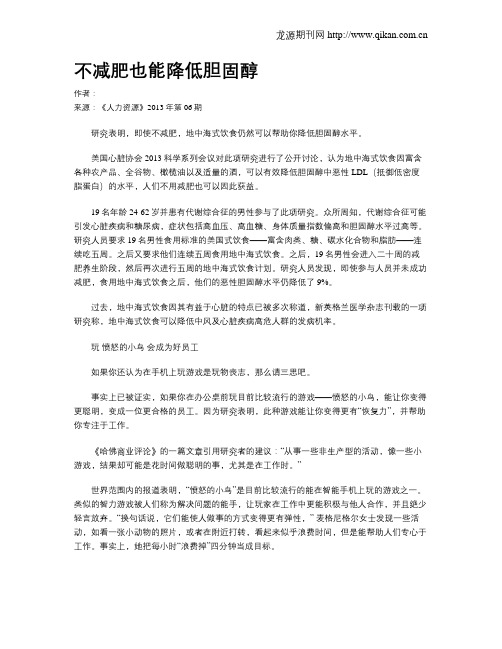
龙源期刊网 不减肥也能降低胆固醇作者:来源:《人力资源》2013年第06期研究表明,即使不减肥,地中海式饮食仍然可以帮助你降低胆固醇水平。
美国心脏协会2013科学系列会议对此项研究进行了公开讨论,认为地中海式饮食因富含各种农产品、全谷物、橄榄油以及适量的酒,可以有效降低胆固醇中恶性LDL(抵御低密度脂蛋白)的水平,人们不用减肥也可以因此获益。
19名年龄24-62岁并患有代谢综合征的男性参与了此项研究。
众所周知,代谢综合征可能引发心脏疾病和糖尿病,症状包括高血压、高血糖、身体质量指数偏高和胆固醇水平过高等。
研究人员要求19名男性食用标准的美国式饮食——富含肉类、糖、碳水化合物和脂肪——连续吃五周。
之后又要求他们连续五周食用地中海式饮食。
之后,19名男性会进入二十周的减肥养生阶段,然后再次进行五周的地中海式饮食计划。
研究人员发现,即使参与人员并未成功减肥,食用地中海式饮食之后,他们的恶性胆固醇水平仍降低了9%。
过去,地中海式饮食因其有益于心脏的特点已被多次称道,新英格兰医学杂志刊载的一项研究称,地中海式饮食可以降低中风及心脏疾病高危人群的发病机率。
玩愤怒的小鸟会成为好员工如果你还认为在手机上玩游戏是玩物丧志,那么请三思吧。
事实上已被证实,如果你在办公桌前玩目前比较流行的游戏——愤怒的小鸟,能让你变得更聪明,变成一位更合格的员工。
因为研究表明,此种游戏能让你变得更有“恢复力”,并帮助你专注于工作。
《哈佛商业评论》的一篇文章引用研究者的建议:“从事一些非生产型的活动,像一些小游戏,结果却可能是花时间做聪明的事,尤其是在工作时。
”世界范围内的报道表明,“愤怒的小鸟”是目前比较流行的能在智能手机上玩的游戏之一。
类似的智力游戏被人们称为解决问题的能手,让玩家在工作中更能积极与他人合作,并且绝少轻言放弃。
“换句话说,它们能使人做事的方式变得更有弹性,” 麦格尼格尔女士发现一些活动,如看一张小动物的照片,或者在附近打转,看起来似乎浪费时间,但是能帮助人们专心于工作。
地中海饮食减肥方法
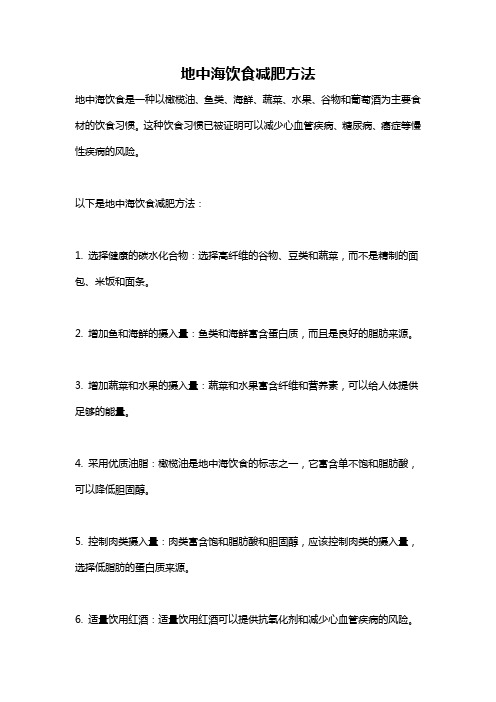
地中海饮食减肥方法
地中海饮食是一种以橄榄油、鱼类、海鲜、蔬菜、水果、谷物和葡萄酒为主要食材的饮食习惯。
这种饮食习惯已被证明可以减少心血管疾病、糖尿病、癌症等慢性疾病的风险。
以下是地中海饮食减肥方法:
1. 选择健康的碳水化合物:选择高纤维的谷物、豆类和蔬菜,而不是精制的面包、米饭和面条。
2. 增加鱼和海鲜的摄入量:鱼类和海鲜富含蛋白质,而且是良好的脂肪来源。
3. 增加蔬菜和水果的摄入量:蔬菜和水果富含纤维和营养素,可以给人体提供足够的能量。
4. 采用优质油脂:橄榄油是地中海饮食的标志之一,它富含单不饱和脂肪酸,可以降低胆固醇。
5. 控制肉类摄入量:肉类富含饱和脂肪酸和胆固醇,应该控制肉类的摄入量,选择低脂肪的蛋白质来源。
6. 适量饮用红酒:适量饮用红酒可以提供抗氧化剂和减少心血管疾病的风险。
总之,地中海饮食是一种健康的饮食习惯,可以帮助减肥。
建议在采用地中海饮食前咨询医生或专业的健康顾问。
生活养生-不吃碳水化合物减肥

文章导读不吃碳水化合物减肥,这个你知道吗,我相信很多人都是不懂的,现在这个社会爱美的人们越来越多了,不仅仅是女性,男性也是,可见肥胖的身材的姑娘可快烦透了,减肥减不下去,什么原因呢,真是奇怪,哈哈我们接下来说一说不吃碳水化合物减肥这个情况吧。
低碳水化合物饮食减肥法俗称“食肉减肥法”,由于这种减肥法是由美国医生艾特金斯(Dr Robert Atkins )于1970年代倡导的减肥饮食法,所以又称“艾特金斯医生饮食法” (Dr. Atkins Diet)。
低碳水化合物减肥法于90年代在世界各地大行其道,其中一个原因是艾特金斯医生的著作《艾特金斯医生的新饮食革命》(Dr.Atkins" New Diet Revolution)在出版后很受注目,目前仍在美国畅销书排行榜之列。
低碳水化合物减肥法主张不要摄取米饭、面食、面包等含淀粉量高的食物,与此同时,增加摄取高蛋白食物,以达到快速减肥的效果。
高蛋白、低碳水化合物减肥法特别受到英国人欢迎,据说有300万名英国人曾经采用低碳水化合物饮食法,占男性人口的百分之七,以及女性人口的百分之十。
英国食物标准局是英国法定的食物安全监管机构,该局虽然并没有直接点名批评“ Atkins Diet”,但却明确指出,长期不吃淀粉质食物对身体健康有害。
值得注意的是,英国食物标准局也指出,低碳水化合物饮食者所摄取的食物脂肪通常偏高,容易增加心脏病、糖尿病以及癌症的危险几率。
食物标准局建议,若要身体健康,最好保持均衡的饮食,不应该省略任何一类食物。
他指出,碳水化合物也是均衡饮食中一个重要的部分,缺乏碳水化合物的饮食不能算是均衡的饮食。
上面可是讲了有关于不吃碳水化合物减肥的知识哦,姑娘帅哥们你们还在盲目的减肥吗,赶快来仔细的阅读一下,相信会给广大的减肥者们很大的帮助哦,要会科学的减肥才是真本事,不合理的减肥方法只会让自己更难受,希望夏天到来得时候,每一个女生都是美丽的公主哦。
减脂公认三大比例文献
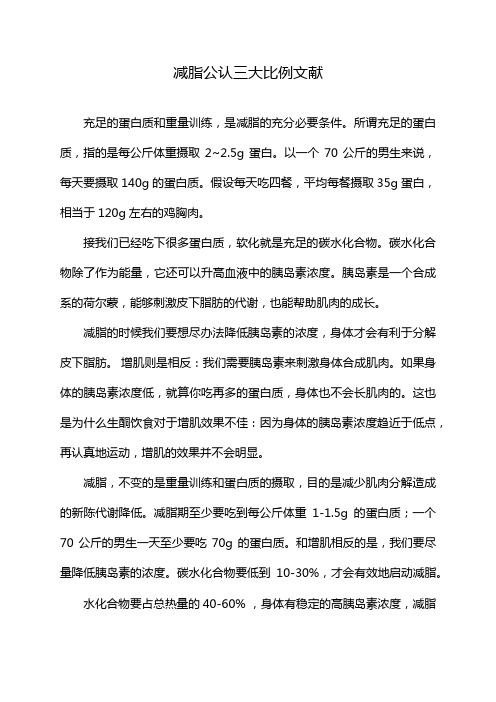
减脂公认三大比例文献
充足的蛋白质和重量训练,是减脂的充分必要条件。
所谓充足的蛋白质,指的是每公斤体重摄取2~2.5g蛋白。
以一个70公斤的男生来说,每天要摄取140g的蛋白质。
假设每天吃四餐,平均每餐摄取35g蛋白,相当于120g左右的鸡胸肉。
接我们已经吃下很多蛋白质,软化就是充足的碳水化合物。
碳水化合物除了作为能量,它还可以升高血液中的胰岛素浓度。
胰岛素是一个合成系的荷尔蒙,能够刺激皮下脂肪的代谢,也能帮助肌肉的成长。
减脂的时候我们要想尽办法降低胰岛素的浓度,身体才会有利于分解皮下脂肪。
增肌则是相反:我们需要胰岛素来刺激身体合成肌肉。
如果身体的胰岛素浓度低,就算你吃再多的蛋白质,身体也不会长肌肉的。
这也是为什么生酮饮食对于增肌效果不佳:因为身体的胰岛素浓度趋近于低点,再认真地运动,增肌的效果并不会明显。
减脂,不变的是重量训练和蛋白质的摄取,目的是减少肌肉分解造成的新陈代谢降低。
减脂期至少要吃到每公斤体重1-1.5g的蛋白质;一个70公斤的男生一天至少要吃70g的蛋白质。
和增肌相反的是,我们要尽量降低胰岛素的浓度。
碳水化合物要低到10-30%,才会有效地启动减脂。
水化合物要占总热量的40-60% ,身体有稳定的高胰岛素浓度,减脂
才会够有效率。
一个身形纤细的纸片人,碳水化合物要吃到60%的高标;体型比较宽厚的人,吃到40%就可以了。
脂肪不需要多,约15-25%就可以了。
如果完全不摄取脂肪,会导致身体无法合成皮质醇,生长激素等等重要荷尔蒙。
减脂期要少淀粉,蛋白质至少要体重一倍量。
- 1、下载文档前请自行甄别文档内容的完整性,平台不提供额外的编辑、内容补充、找答案等附加服务。
- 2、"仅部分预览"的文档,不可在线预览部分如存在完整性等问题,可反馈申请退款(可完整预览的文档不适用该条件!)。
- 3、如文档侵犯您的权益,请联系客服反馈,我们会尽快为您处理(人工客服工作时间:9:00-18:30)。
Weight Loss with a Low-Carbohydrate, Mediterranean,or Low-Fat DietIris Shai, R.D., Ph.D., Dan Schwarzfuchs, M.D., Yaakov Henkin, M.D., Danit R. Shahar, R.D., Ph.D., Shula Witkow, R.D., M.P .H., Ilana Greenberg, R.D., M.P .H., Rachel Golan, R.D., M.P.H., Drora Fraser, Ph.D.,Arkady Bolotin, Ph.D., Hilel Vardi, M.Sc., Osnat Tangi-Rozental, B.A., Rachel Zuk-Ramot, R.N.,Benjamin Sarusi, M.Sc., Dov Brickner, M.D., Ziva Schwartz, M.D., Einat Sheiner, M.D., Rachel Marko, M.Sc.,Esther Katorza, M.Sc., Joachim Thiery, M.D., Georg Martin Fiedler, M.D., Matthias Blüher, M.D.,Michael Stumvoll, M.D., and Meir J. Stampfer, M.D., Dr.P.H.,for the Dietary Intervention Randomized Controlled Trial (DIRECT) GroupABSTR ACTFrom the S. Daniel Abraham Center for Health and Nutrition, Ben-Gurion Uni-versity of the Negev, Beer-Sheva (I.S., D.R.S., S.W., I.G., R.G., D.F., A.B., H.V., O.T.-R.); the Nuclear Research Center Negev, Dimona (D.S., R.Z.-R., B.S., D.B., Z.S., E.S., R.M., E.K.); and the Depart-ment of Cardiology, Soroka University Medical Center, Beer-Sheva (Y.H.) — all in Israel; the Institute of Laboratory Med-icine, University Hospital Leipzig (J.T., G.M.F.); and the Department of Medi-cine, University of Leipzig (M.B., M.S.) — both in Leipzig, Germany; and Chan-ning Laboratory, Department of Medi-cine, Brigham and Women’s Hospital and Harvard Medical School, and the De-partments of Epidemiology and Nutri-tion, Harvard School of Public Health — all in Boston (M.J.S.). Address reprint requests to Dr. Shai at the S. Daniel Abra-ham International Center for Health and Nutrition, Department of Epidemiology and Health Systems Evaluation, Ben- Gurion University of the Negev, P.O. Box 653, Beer-Sheva 84105, Israel, or at irish@bgu.ac.il.This article (10.1056/NEJMoa0708681) was updated on December 30, 2009, at .N Engl J Med 2008;359:229-41.Copyright © 2008 Massachusetts Medical Society.BackgroundTrials comparing the effectiveness and safety of weight-loss diets are frequently limited by short follow-up times and high dropout rates.MethodsIn this 2-year trial, we randomly assigned 322 moderately obese subjects (mean age, 52 years; mean body-mass index [the weight in kilograms divided by the square of the height in meters], 31; male sex, 86%) to one of three diets: low-fat, restricted-calorie; Mediterranean, restricted-calorie; or low-carbohydrate, non–restricted-calorie.ResultsThe rate of adherence to a study diet was 95.4% at 1 year and 84.6% at 2 years. The Mediterranean-diet group consumed the largest amounts of dietary fiber and had the highest ratio of monounsaturated to saturated fat (P<0.05 for all comparisons among treatment groups). The low-carbohydrate group consumed the smallest amount of car-bohydrates and the largest amounts of fat, protein, and cholesterol and had the highest percentage of participants with detectable urinary ketones (P<0.05 for all comparisons among treatment groups). The mean weight loss was 2.9 kg for the low-fat group, 4.4 kg for the Mediterranean-diet group, and 4.7 kg for the low-carbohydrate group (P<0.001 for the interaction between diet group and time); among the 272 participants who com-pleted the intervention, the mean weight losses were 3.3 kg, 4.6 kg, and 5.5 kg, respec-tively. The relative reduction in the ratio of total cholesterol to high-density lipoprotein cholesterol was 20% in the low-carbohydrate group and 12% in the low-fat group (P = 0.01). Among the 36 subjects with diabetes, changes in fasting plasma glucose and insulin levels were more favorable among those assigned to the Mediterranean diet than among those assigned to the low-fat diet (P<0.001 for the interaction among diabetes and Mediterranean diet and time with respect to fasting glucose levels).ConclusionsMediterranean and low-carbohydrate diets may be effective alternatives to low-fat diets. The more favorable effects on lipids (with the low-carbohydrate diet) and on glycemic control (with the Mediterranean diet) suggest that personal preferences and metabolic considerations might inform individualized tailoring of dietary in-terventions. ( number, NCT00160108.)T h e ne w engl a nd jour na l o f medicineT he dramatic increase in obesity worldwide remains challenging and un-derscores the urgent need to test the ef-fectiveness and safety of several widely used weight-loss diets.1-3 Low-carbohydrate, high-pro-tein, high-fat diets (referred to as low-carbohy-drate diets) have been compared with low-fat, energy-restricted diets.4-9 A meta-analysis of five trials with 447 participants10 and a recent 1-year trial involving 311 obese women4 suggested that a low-carbohydrate diet is a feasible alternative to a low-fat diet for producing weight loss and may have favorable metabolic effects. However, longer-term studies are lacking.4,10 A Mediterranean diet with a moderate amount of fat and a high pro-portion of monounsaturated fat provides cardio-vascular benefits.11 A recent review citing several trials12 included a few that suggested that the Med-iterranean diet was beneficial for weight loss.13,14 However, this positive effect has not been con-clusively demonstrated.15Common limitations of dietary trials include high attrition rates (15 to 50% within a year), small size, short duration, lack of assessment of adherence, and unequal intensity of inter-vention.10,12,15-17We conducted the 2-year Di-etary Intervention Randomized Controlled Trial (DIRECT) to compare the effectiveness and safe-ty of three nutritional protocols: a low-fat, restrict-ed-calorie diet; a Mediterranean, restricted-calorie diet; and a low-carbohydrate, non–restricted-calorie diet.MethodsEligibility and Study DesignWe conducted the trial between July 2005 and June 2007 in Dimona, Israel, in a workplace at a research center with an on-site medical clinic. Recruitment began in December 2004. The crite-ria for eligibility were an age of 40 to 65 years and a body-mass index (BMI, the weight in kilo-grams divided by the square of the height in meters) of at least 27, or the presence of type 2 diabetes (according to the American Diabetes As-sociation criteria18) or coronary heart disease, regardless of age and BMI. Persons were exclud-ed if they were pregnant or lactating, had a serum creatinine level of 2 mg per deciliter (177 μmol per liter) or more, had liver dysfunction (an in-crease by a factor of at least 2 above the upper limit of normal in alanine aminotransferase and aspartate aminotransferase levels), had gastro-intestinal problems that would prevent them from following any of the test diets, had active cancer, or were participating in another diet trial.The participants were randomly assigned with-in strata of sex, age (below or above the median), BMI (below or above the median), history of coro-nary heart disease (yes or no), history of type 2 diabetes (yes or no), and current use of statins (none, <1 year, or ≥1 year) with the use of Monte Carlo simulations. The participants received no financial compensation or gifts. The study was approved and monitored by the human subjects committee of Soroka Medical Center and Ben-Gurion University. Each participant provided writ-ten informed consent.The members of each of the three diet groups were assigned to subgroups of 17 to 19 partici-pants, with six subgroups for each group. Each diet group was assigned a registered dietitian who led all six subgroups of that group. The dietitians met with their groups in weeks 1, 3, 5, and 7 and thereafter at 6-week intervals, for a total of 18 sessions of 90 minutes each. We adapted the Israeli version (developed by the Maccabi Health Maintenance Organization) of the diabetes-prevention program19 and developed additional themes for each diet group (see Supplementary Appendix 1, available with the full text of this article at ). In order to maintain equal intensity of treatment, the workshop for-mat and the quality of the materials were similar among the three diet groups, except for instruc-tions and materials specific to each diet strategy. Six times during the 2-year intervention, another dietitian conducted 10-to-15-minute motivation-al telephone calls with participants who were having difficulty adhering to the diets and gave a summary of each call to the group dietitian. In addition, a group of spouses received education to strengthen their support of the participants (data not shown).Low-Fat DietThe low-fat, restricted-calorie diet was based on American Heart Association20guidelines. We aimed at an energy intake of 1500 kcal per day for women and 1800 kcal per day for men, with 30% of calories from fat, 10% of calories from saturated fat, and an intake of 300 mg of choles-terol per day. The participants were counseled to consume low-fat grains, vegetables, fruits, and legumes and to limit their consumption of addi-tional fats, sweets, and high-fat snacks.weight loss with a low-carbohydrate, mediterranean, or low-fat dietMediterranean DietThe moderate-fat, restricted-calorie, Mediterranean diet was rich in vegetables and low in red meat, with poultry and fish replacing beef and lamb. We restricted energy intake to 1500 kcal per day for women and 1800 kcal per day for men, with a goal of no more than 35% of calories from fat; the main sources of added fat were 30 to 45 g of olive oil and a handful of nuts (five to seven nuts, <20 g) per day. The diet is based on the recom-mendations of Willett and Skerrett.21Low-Carbohydrate DietThe low-carbohydrate, non–restricted-calorie diet aimed to provide 20 g of carbohydrates per day for the 2-month induction phase and immediately after religious holidays, with a gradual increase to a maximum of 120 g per day to maintain the weight loss. The intakes of total calories, protein, and fat were not limited. However, the participants were counseled to choose vegetarian sources of fat and protein and to avoid trans fat. The diet was based on the Atkins diet (see Supplementary Appendix 2).22Nutritional and Color Labeling of Foodin the CafeteriaLunch is typically the main meal in Israel. The self-service cafeteria in the workplace provided a varied menu and was the exclusive source of lunch for the participants. A dietitian worked closely with the kitchen staff to adjust specific food items to specific diet groups. Each food item was provided with a label showing the num-ber of calories and the number of grams of car-bohydrates, fat, and saturated fat, according to an analysis based on the Israeli nutritional data-base. Each food item was also labeled with a full circle (indicating “feel free to consume”) or a half circle (indicating “consume in moderation”). The labels were color-coded according to diet group and were updated daily (see Supplementa-ry Appendix 2).23Electronic Questionnaires at Baselineand Follow-upAdherence to the diets was evaluated by a validat-ed food-frequency questionnaire24 that included 127 food items and three portion-size pictures for 17 items.25 A subgroup of participants completed two repeated 24-hour dietary recalls to verify ab-solute intake (data not shown). We used a vali-dated questionnaire to assess physical activity.26At baseline and at 6, 12, and 24 months of fol-low-up, the questionnaires were self-adminis-tered electronically through the workplace intra-net. The 15% of participants who requested aid in completing the questionnaires were assisted by the study nurse. The electronic questionnaire helped to ensure completeness of the data by prompting the participant when a question was not answered, and it permitted rapid automated reporting by the group dietitians.OutcomesThe participants were weighed without shoes to the nearest 0.1 kg every month. With the use of a wall-mounted stadiometer, height was measured to the nearest millimeter at baseline for determi-nation of BMI. Waist circumference was measured halfway between the last rib and the iliac crest. Blood pressure was measured every 3 months with the use of an automated system (Datascop Acutor 4) after 5 minutes of rest.Blood samples were obtained by venipuncture at 8 a.m. after a 12-hour fast at baseline and at 6, 12, and 24 months and were stored at –80°C until an assay for lipids, inflammatory biomark-ers, and insulin could be performed. Levels of fasting plasma glucose, glycated hemoglobin, and liver enzymes were measured in fresh samples. The level of glycated hemoglobin was determined with the use of Cobas Integra reagents and equip-ment. Serum levels of total cholesterol, high-density-lipoprotein (HDL) cholesterol, low-density-lipoprotein (LDL) cholesterol, and triglycerides were determined enzymatically with a Wako R-30 automatic analyzer, with coefficients of varia-tion of 1.3% for cholesterol and 2.1% for triglyc-erides. Plasma insulin levels were measured with the use of an enzyme immunometric assay (Immulite automated analyzer, Diagnostic Prod-ucts), with a coefficient of variation of 2.5%. Plasma levels of high-molecular-weight adiponec-tin were measured by an enzyme-linked immu-nosorbent assay (ELISA) (AdipoGen or Axxora), with a coefficient of variation of 4.8%. Plasma leptin levels were assessed by ELISA (Mediagnost), with a coefficient of variation of 2.4%. Plasma levels of high-sensitivity C-reactive protein were measured by ELISA (DiaMed), with a coefficient of variation of 1.9%. The clinic and laboratory staff members were unaware of the treatment assignments, and the study coordinators were unaware of all outcome data until the end of the intervention.T h e ne w engl a nd jour na l o f medicineStatistical AnalysisFor weight loss, the prespecified primary aim was the change in weight from baseline to 24 months. We used the Israeli food database23 in the analy-sis of the results of the dietary questionnaires. We analyzed the dietary-composition data and bio-markers with the use of raw unadjusted means, without imputation of missing data. We compared the dietary-intake values between groups at each time point with the use of an analysis of variance in which all pairwise comparisons among the three diet groups were performed with the use of Tukey’s Studentized range test. We transformed physical-activity scores into metabolic equivalents per week27 according to the amount of time spent in various forms of exercise per week, with each activity weighted in terms of its level of intensity. For intention-to-treat analyses, we included all 322 participants and used the most recent values for weight and blood pressure. To evaluate the re-peated measurements over time, we used gener-alized estimating equations for panel data analy-sis, also known as cross-sectional time-series analysis, with the use of the Stata software XTGEE command; this allowed us to account for the non-independence of repeated measurements of the same bioindicator in the same participant over time. We used age, sex, time point, and diet group as explanatory variables in our models. To study changes over time and the effects of sex or the presence or absence of diabetes, we added appro-priate interaction terms. We assessed the within-person changes from baseline in each diet group with the use of pairwise comparisons. We calcu-lated the homeostasis model assessment of insu-lin resistance (HOMA-IR) according to the follow-ing equation28: insulin (U/ml) × fasting glucose (mmol/liter) ÷ 22.5. For a mean (±SD) difference between groups of at least 2±10 kg of weight loss, with 100 participants per group and a type I error of 5%, the power to detect significant dif-ferences in weight loss is greater than 90%. We used SPSS software, version 15, and Stata soft-ware, version 9, for the statistical analysis.R esultsCharacteristics of the ParticipantsThe baseline characteristics of the participants are shown in Table 1. The mean age was 52 years and the mean BMI was 31. Most participants (86%) were men. The overall rate of adherence (Fig. 1) was 95.4% at 12 months and 84.6% at 24 months; the 24-month adherence rates were 90.4% in the low-fat group, 85.3% in the Mediterranean-diet group, and 78.0% in the low-carbohydrate group (P = 0.04 for the comparison among diet groups). During the study, there was little change in usage of medications, and there were no sig-nificant differences among groups in the amount of change; four participants initiated and three stopped cholesterol-lowering therapy. Twenty par-ticipants initiated blood-pressure treatment, five initiated medications for glycemic control, and one reduced the dosage of medications for glyce-mic control.Dietary Intake, Energy Expenditure,and Urinary KetonesAt baseline, there were no significant differences in the composition of the diets consumed by par-ticipants assigned to the low-fat, Mediterranean, and low-carbohydrate diets. Daily energy intake, as assessed by the food-frequency questionnaire, decreased significantly at 6, 12, and 24 months in all diet groups as compared with baseline (P<0.001); there were no significant differences among the groups in the amount of decrease (Table 2). The low-carbohydrate group had a low-er intake of carbohydrates (P<0.001) and higher intakes of protein (P<0.001), total fat (P<0.001), saturated fat (P<0.001), and total cholesterol (P = 0.04) than the other groups. The Mediterra-nean-diet group had a higher ratio of mono-unsaturated to saturated fat than the other groups (P<0.001) and a higher intake of dietary fiber than the low-carbohydrate group (P = 0.002). The low-fat group had a lower intake of saturated fat than the low-carbohydrate group (P = 0.02). The amount of physical activity increased significant-ly from baseline in all groups, with no signifi-cant difference among groups in the amount of increase. The proportion of participants with de-tectable urinary ketones at 24 months was higher in the low-carbohydrate group (8.3%) than in the low-fat group (4.8%) or the Mediterranean-diet group (2.8%) (P = 0.04).Weight LossA phase of maximum weight loss occurred from1 to 6 months and a maintenance phase from 7 to 24 months. All groups lost weight, but the reduc-tions were greater in the low-carbohydrate and the Mediterranean-diet groups (P<0.001 for the inter-weight loss with a low-carbohydrate, mediterranean, or low-fat dietaction between diet group and time) than in the low-fat group (Fig. 2). The overall weight changes among the 322 participants at 24 months were −2.9±4.2 kg for the low-fat group, −4.4±6.0 kg for the Mediterranean-diet group, and −4.7±6.5 kg for the low-carbohydrate group. Among the 277 male participants, the mean 24-month weight changes were −3.4 kg (95% confidence interval [CI], −4.3 to −2.5) for the low-fat group, −4.0 kg(95% CI, −5.1 to −3.0) for the Mediterranean-diet* Plus–minus values are means ±SD. To convert values for cholesterol to millimoles per liter, multiply by 0.02586. To convert values for tri-glycerides to millimoles per liter, multiply by 0.01129. To convert values for glucose to millimoles per liter, multiply by 0.05551. To convert values for bilirubin to micromoles per liter, multiply by 17.1. BMI denotes body-mass index, HDL high-density lipoprotein, HOMA-IR ho-meostasis model assessment of insulin resistance, and LDL low-density lipoprotein.† Data were available from 297 participants.‡ Data were available from 302 participants.T h e ne w engl a nd jour na l o f medicineweight loss with a low-carbohydrate, mediterranean, or low-fat dietgroup, and −4.9 kg (95% CI, −6.2 to −3.6) for the low-carbohydrate group. Among the 45 women, the mean 24-month weight changes were −0.1 kg (95% CI, −2.2 to 1.9) for the low-fat group, −6.2 kg (95% CI, −10.2 to −1.9) for the Mediterranean-diet group, and −2.4 kg (95% CI, −6.9 to 2.2) for the low-carbohydrate group (P<0.001 for the in-teraction between diet group and sex). The mean weight changes among the 272 participants who completed 24 months of intervention were −3.3±4.1 kg in the low-fat group, −4.6±6.0 kg in the Mediterranean-diet group, and −5.5±7.0 kg in the low-carbohydrate group (P = 0.03 for the com-parison between the low-fat and the low-carbo-hydrate groups at 24 months). The mean (±SD) changes in BMI were −1.0±1.4 in the low-fat group, −1.5±2.2 in the Mediterranean-diet group, and −1.5±2.1 in the low-carbohydrate group (P = 0.05 for the comparison among groups).All groups had significant decreases in waist circumference and blood pressure, but the dif-ferences among the groups were not significant. The waist circumference decreased by a mean of 2.8±4.3 cm in the low-fat group, 3.5±5.1 cm in the Mediterranean-diet group, and 3.8±5.2 cm in the low-carbohydrate group (P = 0.33 for the com-parison among groups). Systolic blood pressure fell by 4.3±11.8 mm Hg in the low-fat group, 5.5±14.3 mm Hg in the Mediterranean-diet group, and 3.9±12.8 mm Hg in the low-carbohydrate group (P =0.64 for the comparison among groups). The corresponding decreases in diastolic pres-sure were 0.9±8.1, 2.2±9.5, and 0.8±8.7 mm Hg (P = 0.43 for the comparison among groups).Lipid ProfilesChanges in lipid profiles during the weight-loss and maintenance phases are shown in Figure 3. HDL cholesterol (Fig. 3A) increased during the weight-loss and maintenance phases in all groups, with the greatest increase in the low-carbohydrate group (8.4 mg per deciliter [0.22 mmol per liter], P<0.01 for the interaction between diet group and time), as compared with the low-fat group (6.3 mg per deciliter [0.16 mmol per liter]). Tri-glyceride levels (Fig. 3B) decreased significantly in the low-carbohydrate group (23.7 mg per decili-ter [0.27 mmol per liter], P = 0.03 for the interac-tion between diet group and time), as compared with the low-fat group (2.7 mg per deciliter [0.03 mmol per liter]). LDL cholesterol levels (Fig. 3C) did not change significantly within groups, and there were no significant differences between the groups in the amount of change. Overall, the ratio of total cholesterol to HDL cholesterol (Fig. 3D) decreased during both the weight-loss and the maintenance phases. The low-carbohydrate group had the greatest improvement, with a rela-tive decrease of 20% (P = 0.01 for the interaction between diet group and time), as compared with a decrease of 12% in the low-fat group.High-Sensitivity C-Reactive Protein, High-Molecular-Weight Adiponectin, and Leptin The level of high-sensitivity C-reactive protein de-creased significantly (P<0.05) only in the Medi-terranean-diet group (21%) and the low-carbohy-drate group (29%), during both the weight-loss and the maintenance phases, with no significant differences among the groups in the amount of decrease (Fig. 4A). During both the weight-loss and the maintenance phases, the level of high-molecular-weight adiponectin (Fig. 4B) increased significantly (P<0.05) in all diet groups, with no significant differences among the groups in the amount of increase. Circulating leptin, which reflects body-fat mass, decreased significantly (P<0.05) in all diet groups, with no significant differences among the groups in the amount of decrease; the decrease in leptin paralleled the de-crease in body weight during the two phases (Fig. 4C). The interaction between the effects of low-carbohydrate diet and sex on the reduction of leptin (P = 0.04), as compared with the low-fat diet, reflects the greater effect of the low-carbo-hydrate diet among men.Fasting Plasma Glucose, HOMA-IR,and Glycated HemoglobinAmong the 36 participants with diabetes (Fig. 4D), only those in the Mediterranean-diet group had a decrease in fasting plasma glucose levels (32.8 mg per deciliter); this change was significantly differ-ent from the increase in plasma glucose levels among participants with diabetes in the low-fat group (P<0.001 for the interaction between diet group and time). There was no significant change in plasma glucose level among the participants without diabetes (P<0.001 for the interaction among diabetes and Mediterranean diet and time). In contrast, insulin levels (Fig. 4E) decreased sig-nificantly in participants with diabetes and in those without diabetes in all diet groups, with no significant differences among groups in theT h e ne w engl a nd jour na l o f medicineamount of decrease. Among the participants with diabetes, the decrease in HOMA-IR at 24 months (Fig. 4F) was significantly greater in those assigned to the Mediterranean diet than in those assigned to the low-fat diet (2.3 and 0.3, respectively; P = 0.02; P = 0.04 for the interaction among diabe-tes and Mediterranean diet and time). Among the participants with diabetes, the proportion of gly-cated hemoglobin at 24 months decreased by 0.4±1.3% in the low-fat group, 0.5±1.1% in the Mediterranean-diet group, and 0.9±0.8% in thelow-carbohydrate group. The changes were signifi-weight loss with a low-carbohydrate, mediterranean, or low-fat diet* Plus–minus values are means ±SD.† P values for differences among the three diet groups were calculated by analysis of variance, except for urinary ketone values, for which the chi-square test was used. When the difference among the groups was significant (P<0.05), all pairwise comparisons between groups were tested for significance with the use of Tukey’s Studentized range test. The Mediterranean-diet group consumed the largest amounts of di-etary fiber and had the highest ratio of monounsaturated to saturated fat (P<0.05 for all comparisons among treatment groups). The low-carbohydrate group consumed the smallest amount of carbohydrates and the largest amounts of fat, protein, and cholesterol; the percent-age of participants with detectable urinary ketones was also highest in this group (P<0.05 for all comparisons among treatment groups). The amount of decrease in intake of calories was similar among the diet groups.‡ The value for the low-carbohydrate group is significantly different from the value for the low-fat group or the Mediterranean-diet group (P<0.05).§ The value for the low-carbohydrate group is significantly different from the value for the low-fat group (P<0.05).¶ The value for the Mediterranean-diet group is significantly different from the value for the low-fat group or the low-carbohydrate group (P<0.05).‖ The value for the low-carbohydrate group is significantly different from the value for the Mediterranean-diet group (P<0.05).T h e ne w engl a nd jour na l o f medicinecant (P<0.05) only in the low-carbohydrate group (P = 0.45 for the comparison among groups).Liver-Function TestsChanges in bilirubin, alkaline phosphatase, and alanine aminotransferase levels were similar among the diet groups. Alanine aminotransferase levels were significantly reduced from baseline to 24 months in the Mediterranean-diet and the low-carbohydrate groups (reductions of 3.4±11.0 and 2.6±8.6 units per liter, respectively; P<0.05 for the comparison with baseline in both groups).DiscussionIn this 2-year dietary-intervention study, we found that the Mediterranean and low-carbohydrate di-ets are effective alternatives to the low-fat diet for weight loss and appear to be just as safe as the low-fat diet. In addition to producing weight loss in this moderately obese group of participants, the low-carbohydrate and Mediterranean diets had some beneficial metabolic effects, a result sug-gesting that these dietary strategies might be con-sidered in clinical practice and that diets might be individualized according to personal preferences and metabolic needs. The similar caloric deficit achieved in all diet groups suggests that a low-car-bohydrate, non–restricted-calorie diet may be opti-mal for those who will not follow a restricted-cal-orie dietary regimen. The increasing improvement in levels of some biomarkers over time up to the 24-month point, despite the achievement of maxi-mum weight loss by 6 months, suggests that a diet with a healthful composition has benefits be-yond weight reduction.The present study has several limitations. We enrolled few women; however, we observed a sig-nificant interaction between the effects of diet group and sex on weight loss (women tended to lose more weight on the Mediterranean diet), and this difference between men and women was also reflected in the changes in leptin levels. This pos-sible sex-specific difference should be explored in further studies. The data from the few partici-pants with diabetes are of interest, but we recog-nize that measurement of HOMA-IR is not an op-timal method to assess insulin resistance among persons with diabetes. We relied on self-reported dietary intake, but we validated the dietary assess-ment in two different dietary-assessment tools and used electronic questionnaires to minimize the amount of missing data. Finally, one might argue that the unique nature of the workplace in this study, which permitted a closely monitored di-etary intervention for a period of 2 years, makes it difficult to generalize the results to other free-living populations. However, we believe that simi-lar strategies to maintain adherence could be ap-plied elsewhere.The strengths of the study include the one-phase design, in which all participants started simultaneously; the relatively long duration of the study; the large study-group size; and the high rate of adherence. The monthly measurements of weight permitted a better understanding of the weight-loss trajectory than was the case in previ-ous studies.We observed two phases of weight change: initial weight loss and weight maintenance. The maximum weight reduction was achieved during the first 6 months; this period was followed by the maintenance phase of partial rebound and a plateau. Among all diet groups, weight loss was greater for those who completed the 24-month study than for those who did not. Even moderate weight loss has health benefits, and our find-ings suggest benefits of behavioral approaches that yield weight losses similar to those obtained with pharmacotherapy.29。
